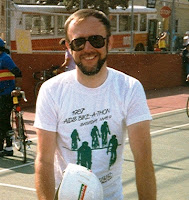I like my doctor. I believe that if you do not like your doctor, you should get a new doctor. It’s a very personal relationship but I do not want my doctor to be my friend. He or she has to know a lot or maybe even everything about me, but my doctor also has to be a scientist who might someday give me some bad news, bad news that I am better off knowing. So you see there’s intimacy involved but not a buddy kind of intimacy.
I used to prefer women doctors but then I had one for a while at Kaiser whom I didn’t like and then I found a male doctor whom I did like so I don’t care anymore about the gender of my doctor. The last woman doctor I had possessed all the traits that I used to identify with not liking in men doctors. She was abrupt, arrogant, and not very communicative. One visit we were dealing with high blood pressure and she just handed me a pill and a glass of water. I had to ask what it was and what I was supposed to do with it. Then she prescribed a medication that was totally wrong for me. It took months but I finally got her to come around to prescribing a better medication that does work for me. I pushed the issue because I got some good advice from friends who were doctors themselves.
After that doctor, I found a really good doc at Kaiser who was very friendly and communicative. He was a gay doctor, of course, and though I insist on being out to any doctor I meet, his being gay made things easier. He also could practice medicine by phone and email without office visits because Kaiser had a system set up to do that. One time I came home from travelling in Europe with a nasty intestinal bug. I described the symptoms to him and he said it sounded like a pretty common problem and I could either do lab tests to determine the precise bug or he could give me a prescription to treat it. I said, in my misery, just treat it. The treatment worked.
But then I changed health insurance plans and had to find a new doctor. I got some referrals from the GLBT Center’s list of gay-friendly providers and set up an appointment. I had some questions and wanted to talk to my doctor candidates to get to know them before I signed on for any treatment. I found a doctor who was easy going and friendly. I told him I was gay and I told him I had a partner whom I expected would be included in any medical issues. He had no problem with that.
I’ve since grown to like and trust my doctor. He doesn’t over treat problems and I am learning from him when to panic and when to just take some aspirin or a nap. He has a casual style I like. When I see him about some problem, he always asks me how big a deal it is, how much something is interfering with my life. There are always treatments doctors can order up, but do you really need or want them? For example, my doctor sent me to a physical therapist to help me through a knee problem instead of to a surgeon for replacement.
Given my own medical history—which is pretty minor—and having lived through the AIDS epidemic with friends and having a husband with a very complicated and ongoing medical condition, I have learned a lot about dealing with doctors and nurses. Here are some tips:
* Nurses are your friends. Do not abuse them, don’t ever get rude or annoyed even when they do things you don’t like. They might know more about you than you do and can really help.
* Do ask, do tell. Tell your doctor everything, ask about everything. Doctors really are people too though they might think they are gods.
* For god’s sake, come out if you haven’t already. Being lesbian or gay is just not the big deal it used to be. You don’t want the closet to interfere with your care and who gets to be with you in difficult times. Jamie and I were even in a hospital in Colorado Springs recently and he introduced me as his husband and I was not denied any access to him in the ER. Boy, did that surprise me. I was still relieved to get out of there.
* Give people a chance to do the right thing. One time we were talking with a nurse in a hospital, telling her our story and she told us about her lesbian sister. She also told us about the discrimination she’s experienced as a Japanese-American.
Going to the doctor can be frightening and worrisome but it doesn’t have to be. But you have to take charge.


No comments:
Post a Comment